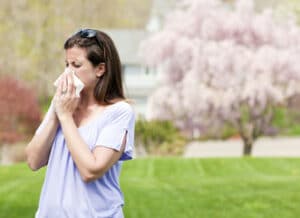
Outdoor allergens changes throughout the year. In the springtime, trees such as birch, oak, and maple begin pollination. Certain grasses, such as Bermuda, also pollinate in the spring. Later in the year, weeds such as ragweed may be a common source of allergy symptoms. Recognizing the severity of your response to various trees and grasses can set you on the right path to minimize exposure as much as possible.
There are a few steps that may be taken to reduce exposure to outdoor allergens. For example, you may identify peak pollen count times. Usually, this is between 8:00 am and noon, and again between 5:00 pm and 9:00 pm. During these hours in which pollen count is higher, you may limit outdoor activities or keep your windows closed to decrease allergy symptoms. Depending on the severity of allergy symptoms, some people also choose to change clothes and shower after spending time outdoors during pollination season.
Trigger avoidance is a common strategy for managing allergy symptoms, but it may not be enough for full relief. An additional step that can help you regulate symptoms may be to consult with your doctor about the use of allergy medication. Allergy testing may also provide valuable information about what specific triggers cause symptoms like sneezing and wheezing.
Are Allergy Shots Necessary?
Allergy shots may be beneficial for individuals for whom allergy symptoms are more severe. This form of immunotherapy is intended to induce tolerance by introducing a diluted mixture of proteins from pollens and other allergens to which you are sensitive. Allergy shots may not be necessary, but they do offer the advantage of long-term effectiveness against irritants like pollen.
Learn more about allergy testing and treatments at the St. Louis Sinus Center. Call 314-450-7720.

